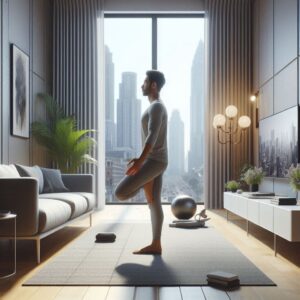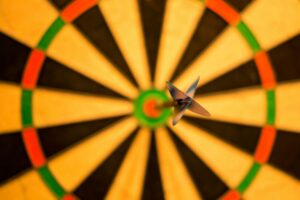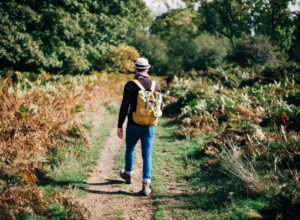10 Daily Habits to Reduce Anxiety
Effective Tips for a Calmer Life
Do you feel anxious? I found 10 daily habits to help you manage stress and find peace. These practical tips can guide you to a calmer, happier life.
Feeling Overwhelmed?

Do you often feel overwhelmed by anxiety?

Believe me, you're not alone. Millions of people, including myself, have struggled with anxiety. But there’s good news: there are simple habits you can add to your daily routine to help you manage and reduce anxiety. Imagine starting your day feeling calm and ending it with a peaceful mind. Sounds wonderful, right?

In this article, I’ll share 10 daily habits that have helped me and many others reduce anxiety and improve overall well-being. Let's get started!
Start Your Day with Deep Breathing Exercises
One of the easiest and most effective ways I’ve found to fight anxiety is through deep breathing exercises. Focusing on your breath helps calm your nervous system and sets a positive tone for the day. There are different breathing exercises you can try. Choose the one that works best for you.

Benefits of Deep Breathing
Deep breathing reduces stress, lowers your heart rate, and promotes relaxation.
Step-by-Step Guide
Inhale deeply through your nose for 4 seconds, hold for 7 seconds, and exhale slowly through your mouth for 8 seconds. Repeat this cycle 5-10 times.
Morning Routine
Add deep breathing exercises to your morning routine to start your day with a sense of calm.

Practice Mindfulness Meditation
Mindfulness meditation has been a game-changer for me. By focusing on the present moment without judgment, I’ve become more aware of my thoughts and feelings, which has significantly reduced my anxiety over time.

5-Minute Body Scan
Find a comfortable spot to sit or lie down. Close your eyes and take a few deep breaths. Start by focusing on your toes and slowly move your attention up through your body, all the way to your head. Notice how each part feels—any tension, relaxation, or sensations. This simple exercise helps you become more aware of your body and can really help you relax.

Mindful Breathing Exercise
Sit comfortably and close your eyes. Take a deep breath in through your nose, hold it for a few seconds, and then slowly breathe out through your mouth. Pay close attention to the feeling of your breath as it moves in and out. This exercise is great for calming your mind and reducing stress.
Impact on Anxiety
Regular mindfulness practice can significantly reduce anxiety and improve overall mental health. (1)
Maintain a Balanced Diet
I’ve noticed that what I eat greatly affects my mental health. A balanced diet gives our brains the nutrients they need to function at their best, which can help reduce anxiety.

Foods that Help Reduce Anxiety
Eat foods rich in omega-3 fatty acids, magnesium, and antioxidants.

Connection Between Nutrition and Mental Health
Proper nutrition will support your brain health and can reduce your symptoms of anxiety.(2)
Meal Planning Tips
Plan your meals to include a variety of fruits, vegetables, lean proteins, and whole grains.

Stay Physically Active
Exercise has been one of my go-to methods for relieving anxiety. Physical activity releases endorphins, those feel-good chemicals in your brain that act as natural painkillers and mood elevators.

Role of Exercise in Managing Anxiety
Regular exercise can reduce stress, improve mood, and boost self-esteem.

Types of Physical Activities
Try activities like walking, jogging, yoga, or dancing. I personally like riding my bike, especially up hills, lifting weights, or speed walking.

Creating a Consistent Routine
I aim for at least 30 minutes of moderate exercise most days of the week. It’s not easy to ride my bike in the rain, but I try to think positively even about doing that!

Keep a Gratitude Journal
Keeping a gratitude journal has made a huge difference in my life. By writing down things I’m thankful for, I’ve been able to shift my focus from negative thoughts to positive ones.

Benefits of Gratitude Journaling
It increases happiness, reduces stress, and improves overall well-being. I also bring to mind, during the day, those things I’m thankful for.

How to Start and Maintain a Gratitude Journal
Write down at least three things you are grateful for each day, and stop to think about them.

Examples of Gratitude Prompts
“What made you smile today?” or “What is something you appreciate about yourself?”

Limit Caffeine and Alcohol Intake
I’ve found that limiting caffeine and alcohol has helped me manage my anxiety better. Both can increase your anxiety and disrupt your sleep, so cutting back has made a big difference.

Effects on Anxiety
Both caffeine and alcohol can increase your anxiety and disrupt sleep. I don’t drink any alcohol and I stopped drinking anything with caffeine, a long time ago.

Tips for Reducing Consumption
Gradually lower you drink and replace it with healthier alternatives. I make my own smoothies with purely natural ingredients and my whole family get them either in the mornings or at midday.

Healthy Alternatives
Try herbal teas, water, or natural fruit juices. The herbal teas can be as simple as putting parsley leaves, for example, in boiling water, leaving there for a few minutes, and then draining them, before drinking. Be careful, though. Wait until it’s cooled down!

Establish a Consistent Sleep Schedule
Getting quality sleep is crucial for managing anxiety. I’ve found that sticking to a consistent sleep schedule helps regulate my body’s internal clock and improves my overall well-being.

Importance of Sleep for Mental Health
Poor sleep can increase your anxiety and stress levels

Tips for Improving Sleep Hygiene
Create a relaxing bedtime routine, avoid screens before bed. Also keep your bedroom cool and dark.

Creating a Bedtime Routine
Include activities like reading, taking a warm bath, or practicing relaxation exercises.

Set Realistic Goals and Prioritize Tasks
Setting realistic goals and prioritizing tasks has been key in managing my anxiety. It helps me manage my time effectively and reduces stress.

Impact of Goal-Setting on Anxiety
Achievable goals can provide a sense of accomplishment and reduce your stress.
How to Set Achievable Goals
Break down larger goals into smaller, manageable steps.
Techniques for Prioritizing Tasks
Use tools like to-do lists, planners, or digital apps to organise your tasks.
Connect with Loved Ones
Connecting with loved ones has been incredibly important for managing my anxiety. Social support provides emotional comfort and can reduce any feelings of isolation.

Importance of Social Support
Strong social connections can improve your mental health and reduce anxiety.

Ways to Stay Connected
Schedule regular catch-ups with friends and family, join social groups, or participate in community activities

Building a Supportive Network
Surround yourself with positive and supportive people.
Take Breaks and Practice Self-Care
Taking regular breaks and practicing self-care has helped me recharge and manage stress more effectively. Simple activities like reading, taking a walk, or practicing a hobby can make a big difference. It works, really.

Role of Self-Care in Anxiety Management
Self-care activities can reduce your stress and improve your overall well-being.
Quick and Effective Self-Care
We need to look after ourselves.
Incorporating Breaks into Your Routine
Schedule short breaks throughout your day to relax and recharge.
Conclusion
Ready to Take Control of Your Anxiety?
Start including these simple daily habits into your routine today and experience a calmer, more balanced life. When you see and feel the difference they make to your life, as I have with mine, you’ll want to share them.
References:
1 – https://positivepsychology.com/benefits-of-mindfulness/
2 – https://www.bmj.com/content/369/bmj.m2382
3 – https://www.sleepfoundation.org/mental-health